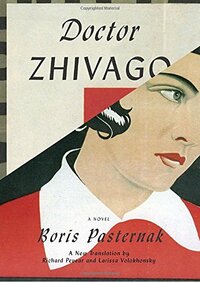Take a photo of a barcode or cover
04/27
who am i kidding. i'm not really reading this.
03/15
so after five years i picked this book up again this winter. i know i love the story bc i've watched any film version of it that has ever been made multiple times. but it is tough going. i think pasternak's descriptions of every day life are beautiful and effecting, the purposelessness of suffering and war are so vivid in this story, he does an incredible job of portraying the beauty of life even in the midsts of horror. he's a powerful writer. but the hundred year old politics are impossible to follow (even though i'm sure there is still fall out today from them) and whose who from what little meeting from some faction you've never heard of and every single thing they said and strange laws and stuff that just do not translate to modern times or resonate at all, as well as the multiple POV switches that seem totally pointless when all you want to hear is what is going on with yuri. it makes me feel like you need a BA in russian history to really get it. but i'm going to tough it out, bc i've been rewarded by toughing it out through russian novels before. it seems like a very russian thing to want to portray not just one persons story but take a snapshot of all life as it was in that moment. it's a very nobel pursuit but it makes for some skimming material, for sure. but this book can't have won a nobel peace prize for nothing. i've got it on audio book, so i'm slowly progressing, one bath at a time.
12/10
okay. let's get real here. i thought that reading doctor zhivago during a seriously intense midwest winter would be sort of romantic. WRONG. at this point i cannot read/watch/listen to/interact with any thing else snow related. i haven't been able to even look at the cover of this book in weeks. i will pick this up again in summer time.
who am i kidding. i'm not really reading this.
03/15
so after five years i picked this book up again this winter. i know i love the story bc i've watched any film version of it that has ever been made multiple times. but it is tough going. i think pasternak's descriptions of every day life are beautiful and effecting, the purposelessness of suffering and war are so vivid in this story, he does an incredible job of portraying the beauty of life even in the midsts of horror. he's a powerful writer. but the hundred year old politics are impossible to follow (even though i'm sure there is still fall out today from them) and whose who from what little meeting from some faction you've never heard of and every single thing they said and strange laws and stuff that just do not translate to modern times or resonate at all, as well as the multiple POV switches that seem totally pointless when all you want to hear is what is going on with yuri. it makes me feel like you need a BA in russian history to really get it. but i'm going to tough it out, bc i've been rewarded by toughing it out through russian novels before. it seems like a very russian thing to want to portray not just one persons story but take a snapshot of all life as it was in that moment. it's a very nobel pursuit but it makes for some skimming material, for sure. but this book can't have won a nobel peace prize for nothing. i've got it on audio book, so i'm slowly progressing, one bath at a time.
12/10
okay. let's get real here. i thought that reading doctor zhivago during a seriously intense midwest winter would be sort of romantic. WRONG. at this point i cannot read/watch/listen to/interact with any thing else snow related. i haven't been able to even look at the cover of this book in weeks. i will pick this up again in summer time.
I stopped in the middle and nothing made sense when I picked it back up. I didn't like it enough to start over, so I think this will forever be unfinished for me.
After reading Doctor Zhivago and Anna Karenina I can say my aversion to visiting Russia is less, but I still would list it as not likely to travel to.
One thing I’ve learned that is vitally important when reading a classic novel is that you have to read the introduction. Sure it might tack on 20-30 extra pages, but they are there for a reason and they reveal so much information that is incredibly useful when reading a book, not to mention they give you a head’s up of what to look for as you read. For example, in the introduction to Doctor Zhivago, the following quote points out how the novel is written.
One thing I’ve learned that is vitally important when reading a classic novel is that you have to read the introduction. Sure it might tack on 20-30 extra pages, but they are there for a reason and they reveal so much information that is incredibly useful when reading a book, not to mention they give you a head’s up of what to look for as you read. For example, in the introduction to Doctor Zhivago, the following quote points out how the novel is written.
“Pasternak’s vision is defined by real presence, by an intensity of physical sensation rendered in the abundance of natural description or translated into the voices of his many characters.” (loc. 146)
And although this prepared me for how the novel, it didn’t really. Doctor Zhivago is only the second piece of Russian literature I can recall reading I don’t want to make any generalizations, but I sort of can. As both this and Anna Karenina are written in the Russian epic style, they both provide broad sweeping views of society, the Russian Landscape and people’s emotions. This is both a good thing and a bad thing and it was definitely an adjustment for me. I’m not sure how much more Russian literature I will read, but it was fun to step out of my comfort zone.
Continue reading on my book blog at geoffwhaley.com.
This is one of those books that leads you to a deeper, more profound appreciation of life, but you could never really point out of the phrase or paragraph that did it. Because it's not just one phrase or one paragraph, or multiple phrases or multiple paragraphs. It's the complex, subtle weaving of word choice, character development, setting description, and plot flow that makes a masterpiece of novel writing. You never really notice it happening, but you come up out of the book with a refreshed awakening for the fragility and joy of life.
I suppose a downside to this kind of book is that you can't just refer to it for shorthand inspiration or useful nuggets. It's something that demands commitment. It is an immersion. And if you're willing to immerse yourself, it is a transformation.
I suppose a downside to this kind of book is that you can't just refer to it for shorthand inspiration or useful nuggets. It's something that demands commitment. It is an immersion. And if you're willing to immerse yourself, it is a transformation.
Goed boek, maar ik heb altijd problemen met de Russische namen, waardoor het extra lang duurt om echt in het verhaa te geraken. Kunnen ze niet gewoon 1 naam gebruiken per personage ipv 3?
Nisam je završio.. ostalo nekih 200 strana, pauza od dva dana, i shvatio da nemam želju da saznam šta se desi u knjizi, samo ću pogledati film.
Osećam se čudno povodom ovog romana, mislim da nije dostojan epiteta ruskih klasika, iako pokušava, prvih sto strana je veoma zbrzano sa novim likovima na svakoj strani koji samo postavljaju temelj za dalje odvijanje radnje.. Zatim je ratni period i sretanja Doktora i Lare super, ali i to nekako brzo prođe. Celokupan utisak mi je da sam prebrzo pročitao, tj. da je čitak roman, ali bez puno značaja. Sada mi već nije stalo ni do koga, sem do Živaga i Lare, a opet su krenuli o nekim revolucionarima.. Bilo mi je dobro što se mogu povući paralele sa trenutnim studentskim blokadama itd.. ali opet, ove godine sam otkrio Selenića koji nam je mnogo bliži i zanimljiviji što se tiče ishoda komunističkih revolucija..
Kao da je pokušao da emulira ruske klasike prethodnog veka, ali po meni, bezuspešno.
Osećam se čudno povodom ovog romana, mislim da nije dostojan epiteta ruskih klasika, iako pokušava, prvih sto strana je veoma zbrzano sa novim likovima na svakoj strani koji samo postavljaju temelj za dalje odvijanje radnje.. Zatim je ratni period i sretanja Doktora i Lare super, ali i to nekako brzo prođe. Celokupan utisak mi je da sam prebrzo pročitao, tj. da je čitak roman, ali bez puno značaja. Sada mi već nije stalo ni do koga, sem do Živaga i Lare, a opet su krenuli o nekim revolucionarima.. Bilo mi je dobro što se mogu povući paralele sa trenutnim studentskim blokadama itd.. ali opet, ove godine sam otkrio Selenića koji nam je mnogo bliži i zanimljiviji što se tiče ishoda komunističkih revolucija..
Kao da je pokušao da emulira ruske klasike prethodnog veka, ali po meni, bezuspešno.
challenging
emotional
hopeful
reflective
sad
slow-paced
Plot or Character Driven:
A mix
Strong character development:
Yes
Loveable characters:
Complicated
Diverse cast of characters:
Yes
Flaws of characters a main focus:
Complicated
emotional
reflective
sad
medium-paced
Plot or Character Driven:
A mix
Strong character development:
Complicated
Loveable characters:
Complicated
Diverse cast of characters:
N/A
Flaws of characters a main focus:
Yes
I made it about 2/5 of the way through before having enough. Pasternak is so full of himself it's nauseating to read. His characters are devoid of personality and act only as mouthpieces for him to eschew his thoughts on art (which are always contradictory), religion (if only the Jews were Christian then they wouldn't suffer so much), and politics (both sides are bad and everyone I disagree with is an incompetent amoral fool and oppression gives people character, damnit!)
Stick to poetry, Pasternak.
Stick to poetry, Pasternak.




